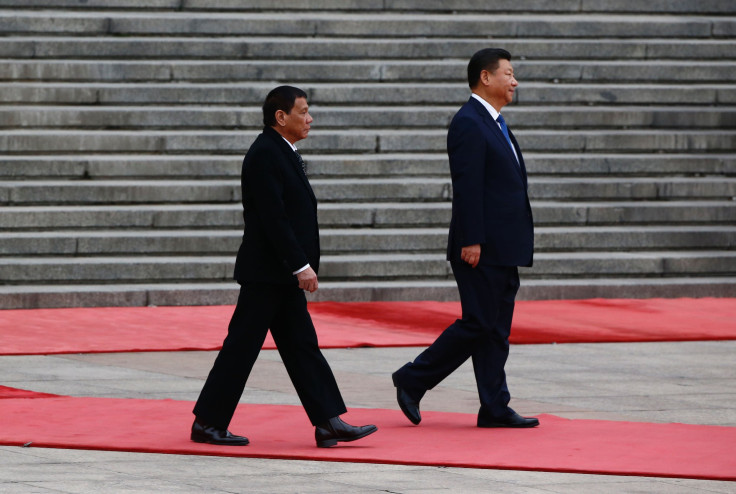Duterte In China, To Raise Thorny South China Sea Dispute With Xi

Philippine President Rodrigo Duterte arrived in Beijing late Wednesday before his scheduled bilateral meeting with Chinese President Xi Jinping on Thursday. Duterte has promised to raise the issue of a 2016 international arbitration ruling with Xi. The ruling invalidated China's claim to sovereignty over most of the South China Sea.
The world will be keeping a close eye on the visit and if it will change the political dynamics in the South China Sea. Chinese vessels have recently made aggressive moves in the exclusive economic zones of Malaysia, Vietnam and the Philippines. The United States has accused China of "coercive interference" and holding $2.5 trillion of oil and gas as a hostage. China responded to those charges calling them "warrantless criticism" using distorted facts.
Duterte is certain to be “under the microscope” by the world stage and his government. He has largely avoided bringing up the topic of the 2016 United Nations ruling at the Hague that was observed by five other Southeast Asian countries plus Japan and proved that there was “significant” support for the ruling and that “international justice does exist and will prevail".
Soon after his election in 2016, Duterte distanced himself from the U.S. – the Philippines closest ally – and warmed up to Xi by heaping praise on the Chinese leader. At the time, large business loans and investments between the two countries seemed possible but after three years, few, if any, deals have come to fruition.
The result of Duterte’s apparent fondness of China is that it emboldened the Communist country to ramp up its navy, coast guard and fishing fleets and stock its new artificial islands in the South China Sea with military supplies. This made the Philippines and other countries bordering the South China Sea more vulnerable to Chinese intrusion.
Duterte’s popularity remains high with most Filipinos who elected him largely on a promise to rid the country of its drug problem even using questionable methods that have drawn the ire of human rights activists. But more recently, his critics want him to take a stronger stance against China and the best way to do that is to confront them with the 2016 UN ruling, introducing resolutions to the UN calling for Chinese compliance, and rallying international support.
If the UN ruling is at the forefront of the talks, China’s response will dictate what will occur afterward. A South China Sea expert, Jay Batongbacal, told the news channel ANC that, "If China pushes, it may raise the possibility of us unifying around that ruling.” By “us” he was referring to powers like the U.S., Japan, India, and Britain as well as other Southeast Asia countries.
© Copyright IBTimes 2025. All rights reserved.





















